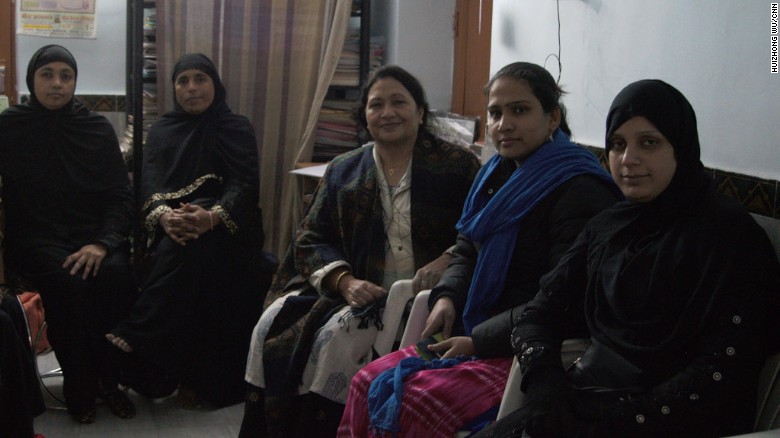Triple talaq: India's battle against three words that grant instant divorce
With just three words, Farha, a 30-year old woman from the northern Indian city of Jaipur, became a single mother of three young children.
Farha's husband instantly divorced her last year by saying "talaq, talaq, talaq" in a fit of anger after their 10-year-old daughter had asked him for five rupees (seven cents) to buy some firecrackers for a holiday celebration.
Sponsor Content
A journey through the culture and history of Abu Dhabi
Discover the wealth of culture and experiences in Abu Dhabi
Content provided by Abu Dhabi Tourism and Culture Authority
Triple talaq, as it is commonly called, is an ancient and controversial Islamic practice where a man divorces a woman by saying the word talaq, the Arabic word for divorce, three times. Sometimes, it's even delivered by phone or text message.
In theory, it should take three months to take effect. In practice, it is often instantaneous -- the woman forced out of the house with barely a moment's notice.
India, home to the second largest Muslim population in the world, is among the few that do not ban the practice. Other countries with majority Muslim populations like Pakistan and Indonesia have outlawed the practice for years.
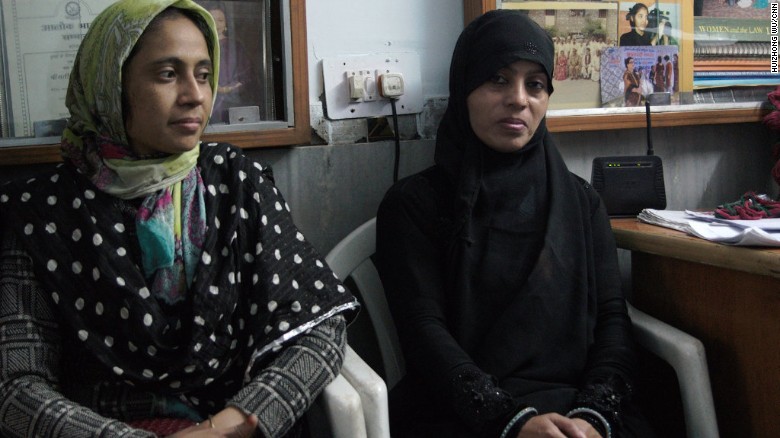
Laika, 42, right, came to the organization for help after her husband gave her instantaneous divorce.
Will it be banned?
ADVERTISING
Yet this could soon change -- a move that would be a victory for Farha and others like her.
The nation's highest legal advisory body, the Law Commission of India, put out a survey to Indian citizens in October 2016, asking about various ways to reform family laws and specifically whether or not to ban talaq.
India's Supreme Court plans to constitute a 5-judge bench to rule on the issue of whether talaq and other practices are un constitutional. It has asked all of the involved parties to submit their evidence in support of their petitions by March 30.
"In a Muslim society which practices talaq, women have no existence," says Farha, who adheres to the local custom of only using one name. "A man can leave a woman at any time because of any issue."
Bharatiya Muslim Mahila Andolan (BMMA) -- a network of Muslim women activists and organizations that operate in 15 states in the country -- is leading a nationwide campaign against talaq.
Its headquarters in Jaipur -- known to tourists as India's Pink City -- is located in a dilapidated building in one of the city's back alleys, which stand in sharp contrast to the decorated rose sandstone for which the city is a famed. It's a one room office, barely six feet wide. Plastic chairs line both sides of the room. It is here that Farha came to seek help.
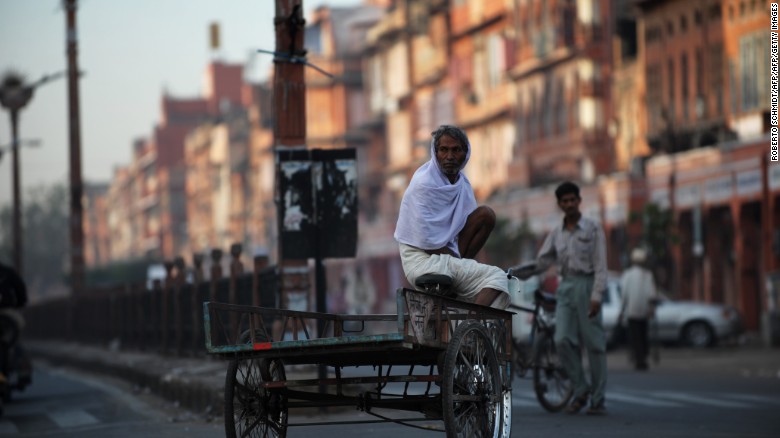
Jaipur is known as the "Pink City" because its prominent buildings are washed in hue of pink.
They have long worked with women like Farha who have been abandoned by their husbands, by helping them file cases with the police or by providing basic necessities.
They aren't advocating the complete erasure of the practice from Islam, but argue that because of the way talaq has been practiced, women need some form of legal recourse when they currently have none.
'Monstrosity'
In the last few years, the campaign has picked up momentum.
In 2016, a judge in a state-level court called the practice a "monstrosity," going on to say that triple talaq "is a cruel and most demeaning form of divorce."
India's Prime Minister Narendra Modi also spoke out against the practice saying India cannot allow the lives of Muslim women to be ruined by three words said on the phone.
Now, the BMMA is awaiting the decision of India's Supreme Court on its petition.
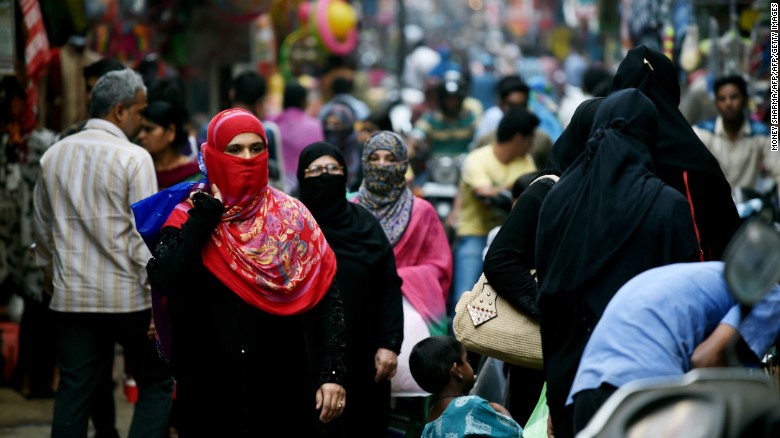
In this photograph taken on April 28, 2016, Muslim shoppers walk through a market in Bhopal.
The group's co-founders, Zakia Soman and Noorjehan, who uses only one name, are hopeful of a ban against the practice which they call "un-Quranic."
According to the Quran, a man must consider the decision for a period of four months after he initially declares talaq, Soman explains. It is only at the end of this period can the divorce be finalized. Islamic law also provides for the presence of an arbitrator if there are problems during the process.
But Soman herself knows that reality often is quite different from theory. Her husband left her immediately after saying the words one day almost 15 years ago.
Pushback
Not everyone, however, is in favor of banning triple talaq.
India's diverse communities of multiple faiths each have their own laws for marriage, divorce and inheritance — matters deemed "personal law." Various politicians have proposed an overarching secular law called the Uniform Civil Code which would replace religious laws.
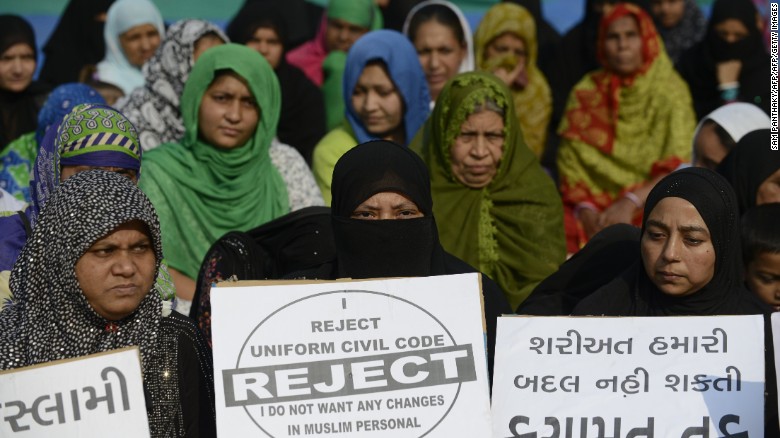
Indian Muslim women participate in a rally to oppose the Uniform Civil Code (UCC) that would outlaw the practice of "triple talaq" in Ahmedabad on November 4, 2016. I
For some Muslim religious leaders, the fact that India's current government — led by a Hindu nationalist party — is in favor of a Uniform Civil Code is a source of concern.
"It is our fundamental given in the constitution, right to abide by our personal laws, you cannot snatch our right from us," said Mohammad Jafar, a life member of the All India Muslim Personal Law Board, the legal organization opposing BMMA's petition filed in the Supreme Court.
Jafar recognizes that it is a problem when some men give divorce instantaneously. The solution, he says, is education for these men, as they have done something not permissible in Islam.
"As a Muslim, one has to follow the rules of marriage and separation according to the Quran and Sunnah, the teachings of Mohammad, so we have to abide by it, and this right has been given in the Constitution, so why do they want to change it?" he said.
Still fighting
Soman and the BMMA, however, see the fight at hand as one for gender equality.
Farha, the single mother of three from Jaipur, now relies on the help of her parents to feed and support her children.
She stays in the upper floor of the same house that she lived in when she was married. Her husband lives below. A housewife for years, Farha, does not have a job.
All she wants, she says, is for her children to be provided for.
For women like Farha, there are few legal resources that she can rely on after a man abandons her.
"The problem here is not religion, it's patriarchy masquerading as religion," Soman said.
News Courtesy: www.cnn.com

